
Is there nothing law enforcement officers won’t do? To the extent any profession is known to go out of its way, policing is up there. Although “taking out the trash” has a metaphorical connotation —a negative one— it seems cops are also literally conducting cleanup operations in their respective jurisdictions.
With the rampancy of homelessness in cities across America, exacerbated by current economic conditions (more so impacted by a federal administration dead-set on catering to illegal immigrants over its citizens) health hazards fester and require redress.
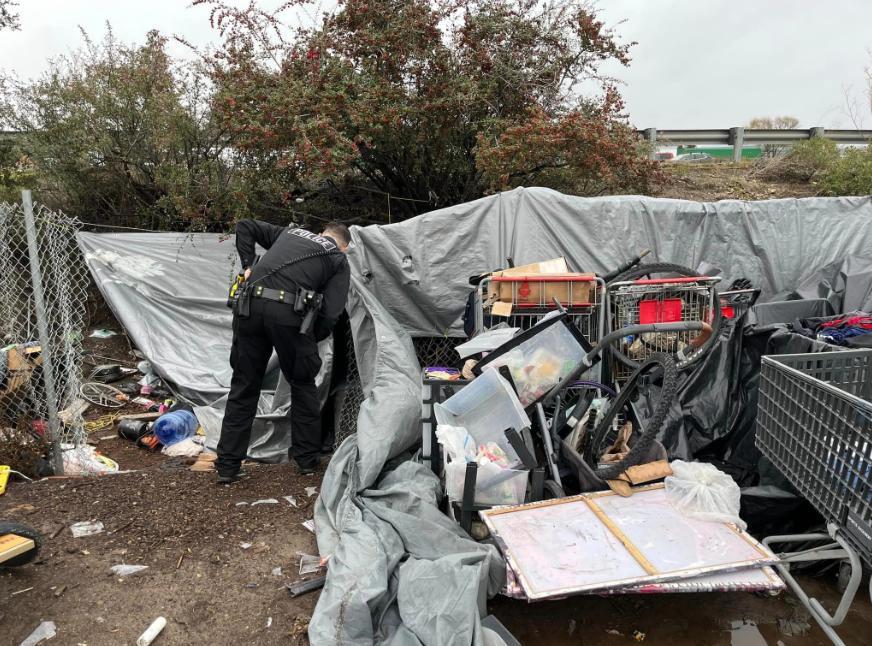
(Photo courtesy of the Redwood City Police Department.)
Why write about garbage? While it may seem an esoteric thing, it emphasizes one of the myriad political failures otherwise addressed by those targeted by defunders and abolitionists: Cops. Also because I’ve failed to find anti-police sorts and their trumpeting politicos picking up trash, anywhere, including their go-to trash-talk against first responders.
Nevertheless, as usual, cops have been doing more than their fair share…and then some, beautifying the as they go.
Even though homeless issues and inherent public health woes are not necessarily new in society, law enforcement officers have been increasingly lending hands and tidying up locales, effectively preserving residents and merchants by improving conditions left to decay for too long.
In that context, I came across various police entities with either formal or informal squads of officers doing the dirty work of collecting litter along their beat.
Leveraging Law Enforcement Unorthodoxly
The San Joaquin County Sheriff’s Office (SJCSO) in California has its own “Sheriff’s Community Corps” consisting of a dedicated group of sworn and non-sworn individuals operating a full-size sanitation truck to haul away debris from eyesores that have ignored all other efforts to clean up their own act.
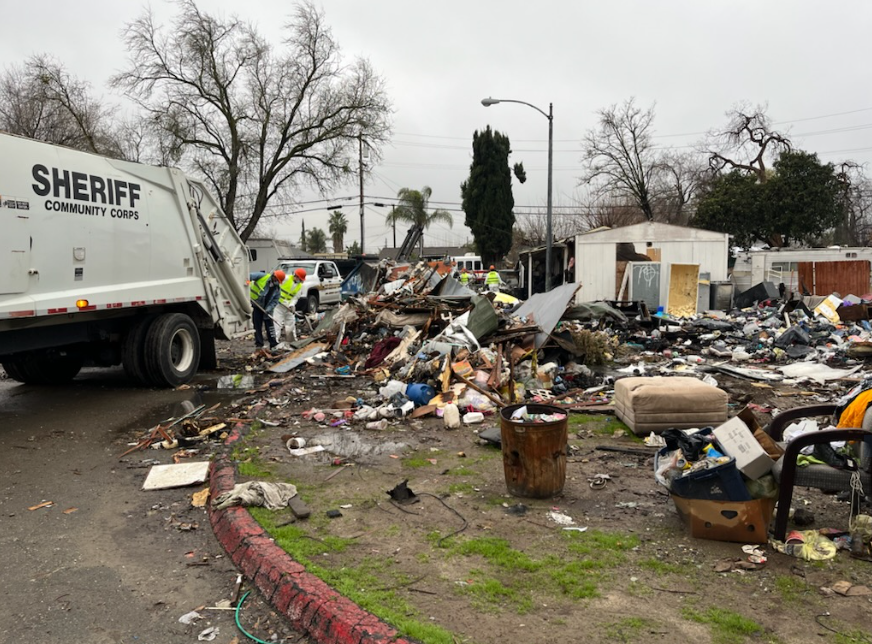
(Photo courtesy of the San Joaquin County Sheriff’s Office.)
On January 19, 2023, the SJCSO posted the following to describe the activities illustrated in the image:
“Team effort underway to mitigate unhealthy and unsafe conditions.
“Conditions at the Stockton Park Village mobile home park […] has increasingly become unsafe, unsanitary, and hazardous. In 2022 alone, there were 183 calls for service at the park, [amounting to plenty of responses by public safety personnel], and multiple abatement operations have been conducted at the location regarding trash, rodent and insect infestation, open sewage, and other issues.” Those “other issues” are ordinarily of the criminal kind.
“On January 4, 2023, an existing court order regarding the park was updated by the Superior Court of San Joaquin County, allowing the County to abate the nuisance conditions.
“Our Special Services Division, and Community Revitalization Unit, in particular, were created for exactly this purpose. By abating this property, we expect the calls for service to drastically decrease, allowing Patrol resources to focus on other areas of need.”
That last part describes the unnecessary drain on public safety resources. So, with a court order in hand, LEOs and civilian staff from the county raked it all in and carted it off to the landfill.
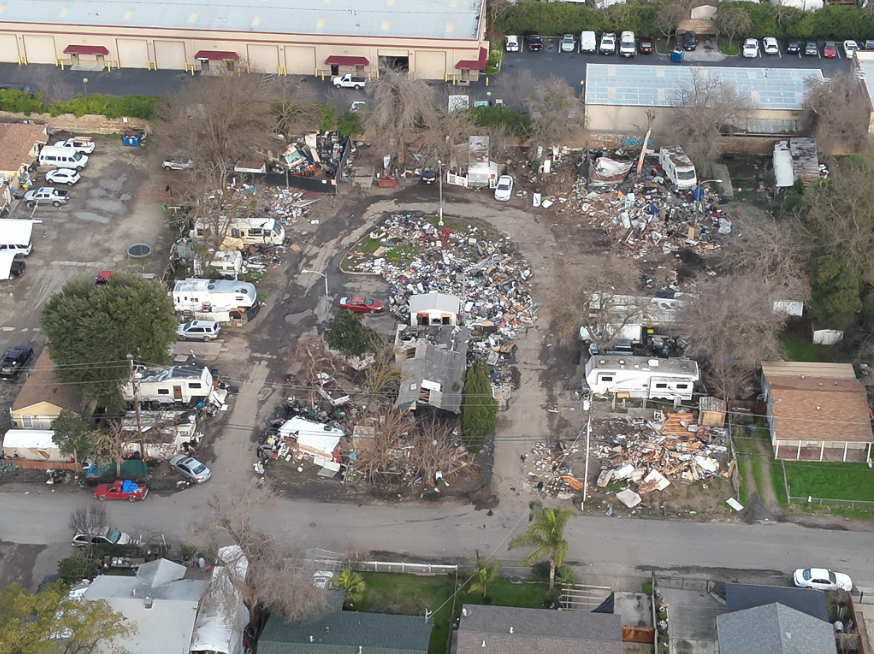
(Aerial view of unsightly enclave mitigated by sheriff’s office crew. Photo courtesy of the San Joaquin County Sheriff’s Office.)
In the sheriff’s office press release, notice how long it took and how many opportunities were provided to land/mobile trailer owners to clean up their act. Although cops are not necessarily in the sanitation biz, this is a case example of what law enforcement does and how it over-extends itself to meet the many needs of a community.
Exemplifying this is the formation of the sheriff’s office Community Revitalization Unit. Incidentally, the aerial image was accomplished by the agency’s drone unit, which can spot similar trouble/trash targets for enforcement activity and cleanup efforts.
Similarly, the Garden Grove Police Department in California also has a unit formed for environmental hazard mitigation. The agency’s Special Resource Team (SRT) members coopt with other city departments such as Garden Grove Public Works (sanitation trucks, dump trucks, flatbeds, etc.) to orchestrate cleanup endeavors and remedy blight.
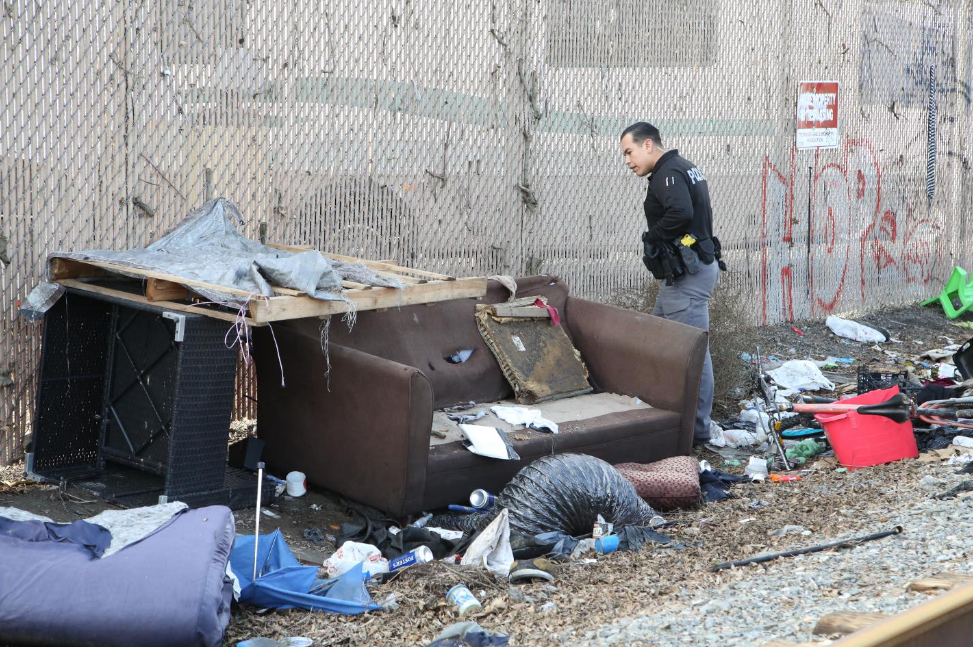
(Photo courtesy of the Garden Grove Police Department.)
On January 21, 2023, the Garden Grove PD press release cited the following:
“SRT Outreach & Cleanup Recap: last week, Garden Grove PD’s Special Resource Team (SRT) collaborated with Be Well OC and Garden Grove Public Works Department to conduct outreach and clean-up of several locations in Garden Grove” and areas along the railroad tracks.
“During the clean-up, four subjects were contacted and offered resources. Three individuals agreed to the help; one refused assistance.”
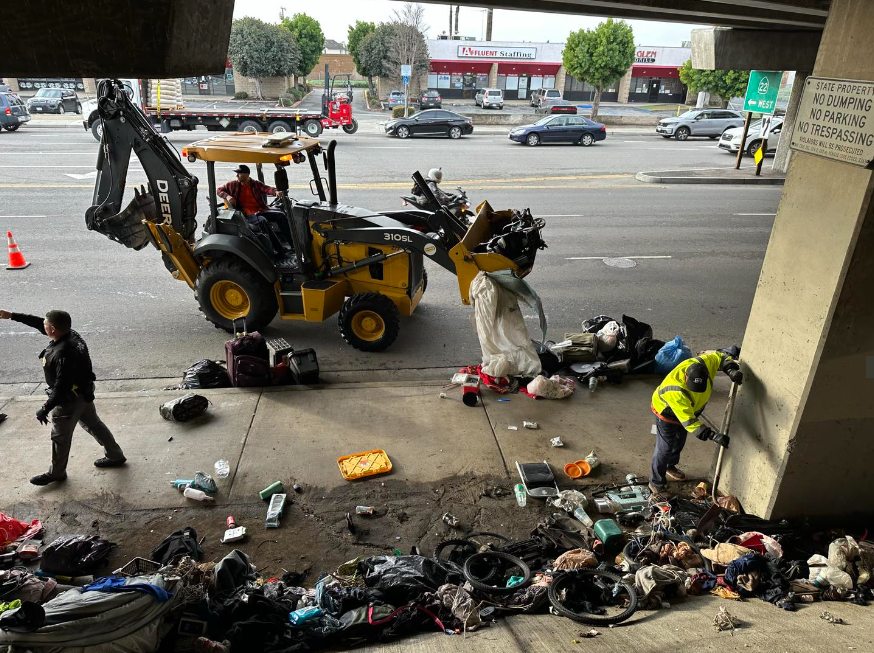
(Photo courtesy of the Garden Grove Police Department.)
Note the “No Dumping” sign in that picture.
Note the businesses trying to make a living across the street, their potential for customers is likely hindered due to the mess across the street (not anymore).
Note the cop wearing gloves, playing a lead role in litter resolution.
Law enforcement organizations without formal units designed to address environmental issues, such as sidewalks nocturnally turned into dump-sites, essentially gather as grassroots cadres and clean up eyesore areas while monitoring police frequencies for more urgent responses.
That is what you see in today’s cover photo: a modest squad of Yuba City, California, police department (YCPD) officers deciding to aggregate trash from roadside areas and haul it for proper disposal. Per a YCPD press release:
“Our A-Day Shift Officers noticed a collection of shopping carts and trash near B Street and N. Palora Avenue. Throughout their rotation, they have tried to help beautify our city one location at a time. This is one location of many, that they have already helped clean. We appreciate you guys.”
The examples of cops cleaning up that we depicted herein are all recent. Similar future endeavors by law enforcement agencies remain to be seen, especially with the needless dwindling of police personnel thanks to the demonization, demoralization, and defunding garbage generated by folks who dare not personally pick up litter and unsightly things in their very own jurisdictions.
Albeit largely informal nowadays, cops are doing far more than they should while working with much less than they earnestly deserve.
Sanitation Police?
One of my first jobs right out of high school was wearing a badge as a security officer serving at New York City’s Environmental Protection Agency, where administrative hearings were held by magistrates (most were retired Superior Court judges) adjudicating violators of NYC’s environmental health codes, as cited by the New York City Department of Sanitation Police.
Formed in 1936, the NYC Dept of Sanitation Police (aka “Environmental Police”) force employees “approximately 130 officers, lieutenants, inspectors and chiefs” and “is made up of regular sanitation personnel who are specially chosen from a list of Department-employed applicants who have volunteered to undertake law enforcement duties. Officers maintain the civil service title of SANITATION WORKER.”
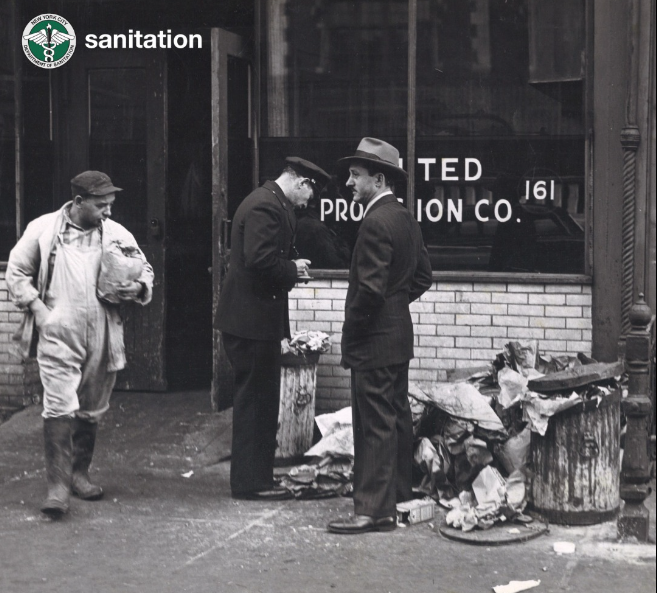
(Photo courtesy of the NYC Department of Sanitation.)
NYC Sanitation cops fall under the “special officer” category in law-enforcement parlance. Like the other array of NYC specialized police agencies throughout the five-county metropolis, Sanitation officers wear the same uniform as the NYPD, except for the words “Sanitation” and “Environmental Police” embroidered into the shoulder patches. (They do, however, operate squads of undercover officers dressed in street clothes and unmarked cruisers, primarily concentrating on illegal dumping, meaning plenty of “sit-tight” surveillance.)
The news reporter in that brief video cited about 320 Sanitation Police officers, differing from the 130-ish head-count data cited elsewhere. Given the enormity of the Big Apple, it’s fair to say the larger number is accurate.
Primarily, though, these specialized cops patrol the city in fully-marked cruisers and also walk a beat, addressing and issuing summonses for violation of city environmental codes. Like any other citation, recipients have the right to defend themselves in the environmental court system mentioned above.
There, I saw contingents of Sanitation cops walk in, sign a registry at my desk, and provide the case numbers toward which they were there to testify. This was well before the ubiquity of cell phone cameras to record evidence of their findings leading to issuing citations to residents and merchants; believe it or not, Polaroids were the relative norm. Some Sanitation peace officers used 35mm, had the “Kodak roll” developed at a photo lab, and proffered those pictures as submitted evidence.
My, we’ve come a long way!
Overall, the comments from the public imploring all efforts by police officials among various law enforcement agencies specifically addressing litter and unkempt premises marking declining quality of life…are abundant and encourage more clean slates.